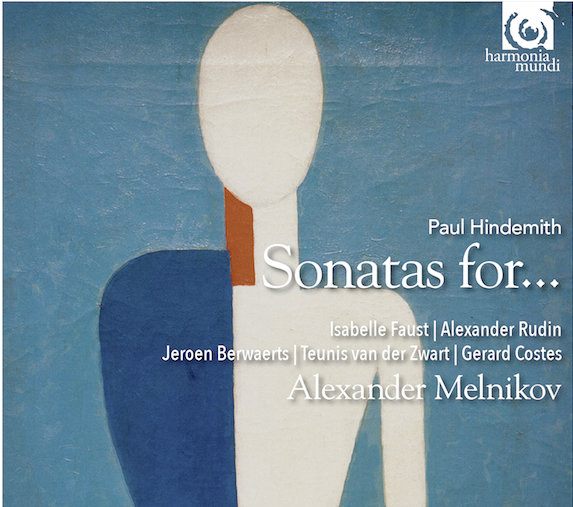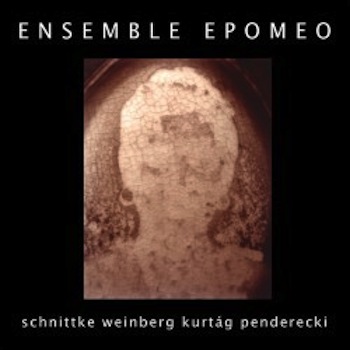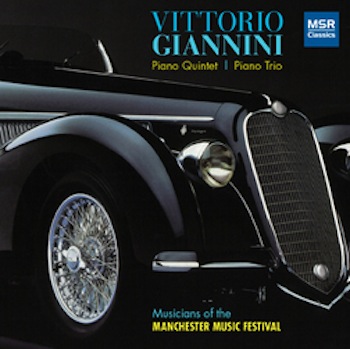CD Review Round-up: Hindemith Sonatas, Montage, Ensemble Epomeo, Vittorio Giannini Chamber music
Evaluations of a number of intriguing new albums, including praise for a disc of string trios by Eastern European composers performed by Ensemble Epomeo.

By Jonathan Blumhofer
There were few instruments the composer Paul Hindemith met that 1) he didn’t write for and 2) he didn’t become at least a proficient performer upon. Sonatas for five of them – althorn, cello, trombone, violin, and trumpet (all with piano) – are the focus of an intriguing new release from Harmonia mundi (HM).
Individually, each performance on this disc is strong, though it’s hard to imagine that not being the case considering the impressive lineup of soloists HM has assembled. Gérard Costas brings a nice swagger to the Trombone Sonata; Isabelle Faust delivers a shapely, tonally beautiful reading of the Violin Sonata; and Jeroen Berwaerts turns in a fine, tragic account of the Trumpet Sonata. Teunis van der Zwardt impresses in the Althorn Sonata, as does Alexander Rudin in the brooding Cello Sonata. Alexander Melnikov is the fearless pianist in all five.
None of these pieces offer any real surprises – if you’re already familiar with Hindemith’s musical language, you pretty much know what you’re going to get – but they do allow for at least a partial reassessment of Hindemith’s output. He was an uneven composer to be sure and his music isn’t always the warmest stuff out there. But here, especially in the brass and violin sonatas, you get a sense of a brilliant composer deeply engaged with the world and his times, and, through that, crafting some music of timeless, deep expression.

Pianist Gloria Cheng — she has her work cut out for her on this disc.
What happens when you ask a few of the biggest names in contemporary movie music to write solo piano pieces for a new album by Gloria Cheng? Montage, Cheng’s new release from HM, suggests that they’ve got much more to say than just what you hear in the theater.
Don Davis’s Surface Tension sure seems to, what with its spastic changes of mood, punchy rhythms, and sometimes-caustic harmonic palate. So, too, Bruce Broughton’s Five Pieces for Piano, a work whose outer, bellicose movements frame some tender moments and a thoroughly engaging set of variations in between.
Michael Giacchino’s Composition 430, a nostalgic recollection of childhood, comes closest to the stereotype of movie music, filled with lush, Brahmsian touches and swells of lyricism that sound lovely but don’t leave much of an impression. Alexandre Desplat’s “L’Étreinte” (from Trois Études) works a bit better, its cloudy, Debussy-inflected harmonies giving way to impassioned, sensuous outbursts. Perhaps the most striking piece here is John Williams’s Conversations, a series of imagined dialogues between various figures of different eras. It’s dark and jazzy. I can’t say that I’ve found much of Williams’s previous concert music more than tendentious, but this is a piece I haven’t yet been able to shake.
And the great Randy Newman’s Family Album isn’t one to stray too far from his familiar paths. But it needn’t: Newman’s are comfortable, often lovely avenues, and Album offers some touching (and often humorous) portraits of its composer’s storied musical relations. It doesn’t take itself too seriously and, as a result, is the easiest charmer on this album.
Cheng, who’s often found playing the most challenging contemporary fare, has her work cut out for her on this disc, especially in the often marvelously aggressive Williams score. She performs it all with assured technique and lots of color.

The string trio, the sad sister of string chamber music genres, had a pretty good 20th century, at least in the hands of Eastern European composers. Or so one might conclude after hearing Ensemble Epomeo’s outstanding new album from Avie Records.
Its highlight is, without a doubt, Alfred Schnittke’s awesome, powerful Trio. I’ve often found Schnittke a frustrating composer: he tends to ramble and embrace dissonance as an end in itself rather than a means to an expressive goal. But in this 1985 score, the music’s tragic power is focused and concentrated. Not a crunching chord is out of place. And there’s plenty of soaring melodic writing, too. In sum, it’s a winner and gets an appropriately fiery performance from Ensemble Epomeo. György Kurtág’s Signs, Games, and Messages also comes across strongly, its richly acerbic harmonic language packing a mighty punch.
Mieczyslaw Weinberg’s and Krzysztof Penderecki’s respective String Trios complete the album and, while neither possesses the fearsome immediacy of the Schnittke, they complement its shadows with various shadings of light.
There are moments when Ensemble Epomeo’s playing sounds downright orchestral – I could have sworn there were more than three players at work at several points in the Kurtág – but is always engaged with the spirit of each piece. Avie’s recorded sound quality is excellent and the album’s substantial liner notes are deeply informative. In short, this is a can’t-miss disc that heralds an ensemble to watch.

What do get when you throw together the plangent lyricism of Brahms, the sweeping melodic style of Ravel, and the occasional rhythmic bite of Stravinsky? Probably something closely approximating Vittorio Giannini’s Quintet for Piano and Strings. Or so I imagined after listening to MSR Classics’ new all-Giannini disc played by musicians of the Manchester Music Festival. This isn’t music that breaks any new (for the time) or even particularly interesting ground: Giannini, who lived between 1903 and 1966, seems to have been perfectly content exploring the rich resources of chromatic tonal harmony. Of course there’s nothing wrong with that. Technically, both the Quintet and the Piano Trio are well written, often quite beautiful, and nearly always sumptuously lyrical. The only problem with them is that, as often seems to happen with music that follows a too-self-consciously-conservative creed, there’s a certain facelessness to both of them.
The performances here, certainly, do their best to rectify that deficiency. They’re fiery and impassioned, and, in the finale of the Quintet, especially, truly electrifying. The opening movement of the Trio unfolds with easy charm and lots of heart. Adam Neiman dazzles throughout with his readings of the involved keyboard parts, and none of the string performances in either piece are anything less than first-rate.
It’s hard to imagine either of these pieces pushing aside the canon of Brahms, Franck, Mendelssohn, Ravel, and others: fairly or not, everything Giannini had to say in these works was already stated by other composers by the time he was ten. If, however, you can get past the questions about style that his music inevitably raises, there are moments in each of work on this disc that are genuinely affecting. That, in the long run, is the goal of most lasting music and, if one can infer such things from the album’s liner notes, Giannini’s aim: mission (in part, at least) accomplished.
Jonathan Blumhofer is a composer and violist who has been active in the greater Boston area since 2004. His music has received numerous awards and been performed by various ensembles, including the American Composers Orchestra, Kiev Philharmonic, Camerata Chicago, Xanthos Ensemble, and Juventas New Music Group. Since receiving his doctorate from Boston University in 2010, Jon has taught at Clark University, Worcester Polytechnic Institute, and online for the University of Phoenix, in addition to writing music criticism for the Worcester Telegram & Gazette.
Tagged: Avie records, Chamber music, Ensemble Epomeo, Gloria Cheng, Harmonia Mundi, Hindemith Sonatas, Montage, MSR Classics
